June 11 - 17, 2017: Issue 316
United Nations Ocean Conference: Australian support to the Pacific for implementation of Sustainable Development Goal 14

Ghost Net Sculptures at Ocean Exhibit
“Ghost net” sculptures created by Pormpuraaw indigenous people in Australia are part of an exhibit entitled “Save Our Ocean” during the 5-9 June Ocean Conference at UN headquarters in New York. photo courtesy United Nations HQ, New York - UN Photo/Kim HaughtonAustralian support to the Pacific for implementation of Sustainable Development Goal 14
7 June 2017: Minister for International Development and the Pacific, Senator the Hon Concetta Fierravanti-WellsToday, at the United Nations Ocean Conference in New York, I announced ongoing Australian support to the Pacific for implementation of Sustainable Development Goal 14 – to conserve and sustainably use the oceans, seas and marine resources for sustainable development.
Australia will commit $4.4 million over four years to build legal and technical capacity for cooperative surveillance and enforcement activities to address illegal fishing in the Pacific.
This will support Australia’s long-standing relationship with the Forum Fisheries Agency and Pacific Island Countries to build capacity to prevent, deter and eliminate illegal, unreported and unregulated fishing. Separately, Australia has made a contribution over 30 years to build physical capacity, including replacement of patrol boats and a new aircraft.
Australia will also commit a further $2 million to continue working with our Pacific neighbours through the Pacific Community to implement international law by providing technical and legal support for maritime boundary delimitation.
In the Pacific, many countries have marine jurisdictions – areas thousands of times larger than their land mass – that are not yet fully defined. Defining jurisdictional rights is an important first step towards deriving economic benefit from the ocean and its resources.
Our long-standing partnership with the Pacific Community has led to lodgement with the UN of approximately two-thirds of the shared boundaries in the Pacific Islands region.
Australia's voluntary commitments to ocean health on World Ocean Day can be found at: The Ocean Conference website.
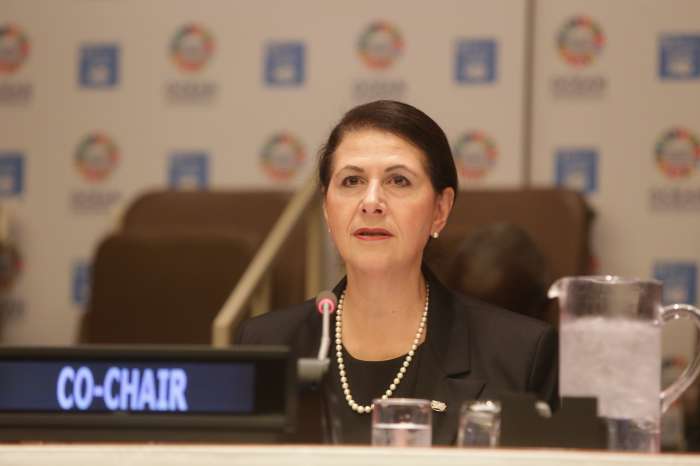
9 Jun 2017 - Morning session of the Ocean Conference at the UNHQ, NY - Senator the Hon Concetta Fierravanti-Wells
UN Secretary-General opens Ocean Conference, calling on countries to set aside short-term gain to avoid catastrophe
New York, 5 June, 2017
Conference focuses attention on ocean pollution, overfishing and climate impacts
Warning that the special relationship between people and the ocean that brings untold benefits for life is under threat as never before, United Nations Secretary-General António Guterres told the opening of the Ocean Conference that the problems of the ocean—all created by human activity, can all be reversed and prevented with decisive, coordinated action.
Conference focuses attention on ocean pollution, overfishing and climate impacts
Warning that the special relationship between people and the ocean that brings untold benefits for life is under threat as never before, United Nations Secretary-General António Guterres told the opening of the Ocean Conference that the problems of the ocean—all created by human activity, can all be reversed and prevented with decisive, coordinated action.
“Oceans are a testing ground for the principle of multilateralism,” he said. “The health of our oceans and seas requires us to put aside short-term national gain, to avoid long-term global catastrophe.”
“Conserving our oceans and using them sustainably is preserving life itself,” he added.
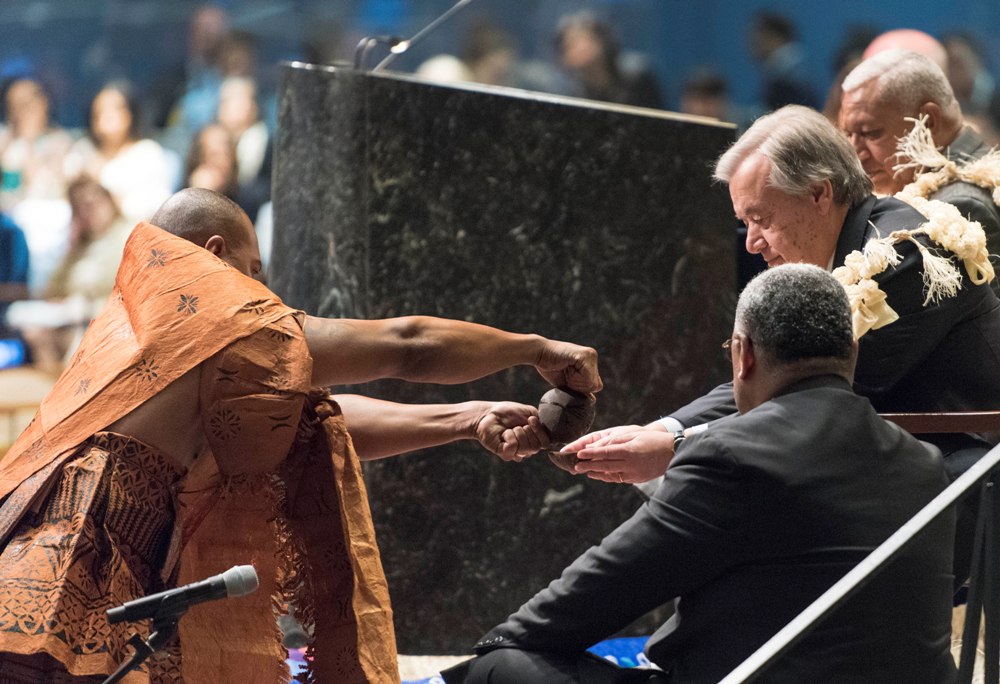
Secretary-General António Guterres (second from left) with Josaia V. Bainimarama, Prime Minister of the Republic of Fiji, during the Fijian traditional welcome ceremony to open the Conference. - UN Photo/Mark Garten
World leaders joined representatives from civil society, business, academia and science at the Ocean Conference at UN Headquarters in New York in calling for accelerated action to reverse the deterioration of the ocean.
The opening of the Conference has been marked by a surge in the number of voluntary commitments to take action to improve the health of the ocean—more than 700 commitments have been received.
The President of the UN General Assembly, Peter Thomson, said in the opening session: “In most probability this conference represents the best opportunity we will ever have to reverse the cycle of decline that human activity has brought upon the Ocean.”
He added that the central conclusion for humankind at this time is clear: “if we want a secure future for our species on this planet, we have to act now on the health of the ocean and on climate change.”
But Thomson also voiced a measure of optimism, noting: “The good news is that we have already taken decisive action. We put in place SDG14 within the 2030 Agenda. Remedial Ocean action is getting underway. And we have ratified the Paris Climate Agreement. Remedial climate action is already underway!”
The Conference, co- hosted by Fiji and Sweden, began with a solemn Fiji ceremony that is accorded to high dignitaries to formally welcome and receive them into a community. The heart of a Fijian traditional welcome ceremony symbolizing the deep regard for communal ties and respect for the value of working together to achieve common goals or mutual benefit.
Swedish Deputy Prime Minister Isabella Lövin said in the opening session, Sweden remains fully committed to maintaining the political momentum created by the adoption of the Paris Agreement, the 2030 Agenda and SDG 14, and called upon all United Nations Member States–as well as other critical stakeholders, including business, civil society and academia–to harness this unique opportunity, and start working to make a real difference.
“We are truly looking forward to seeing new partnerships being formed, and new voluntary commitments on SDG 14 being submitted during and after the conference, and warmly welcome the commitments already made. The momentum is really energizing.”
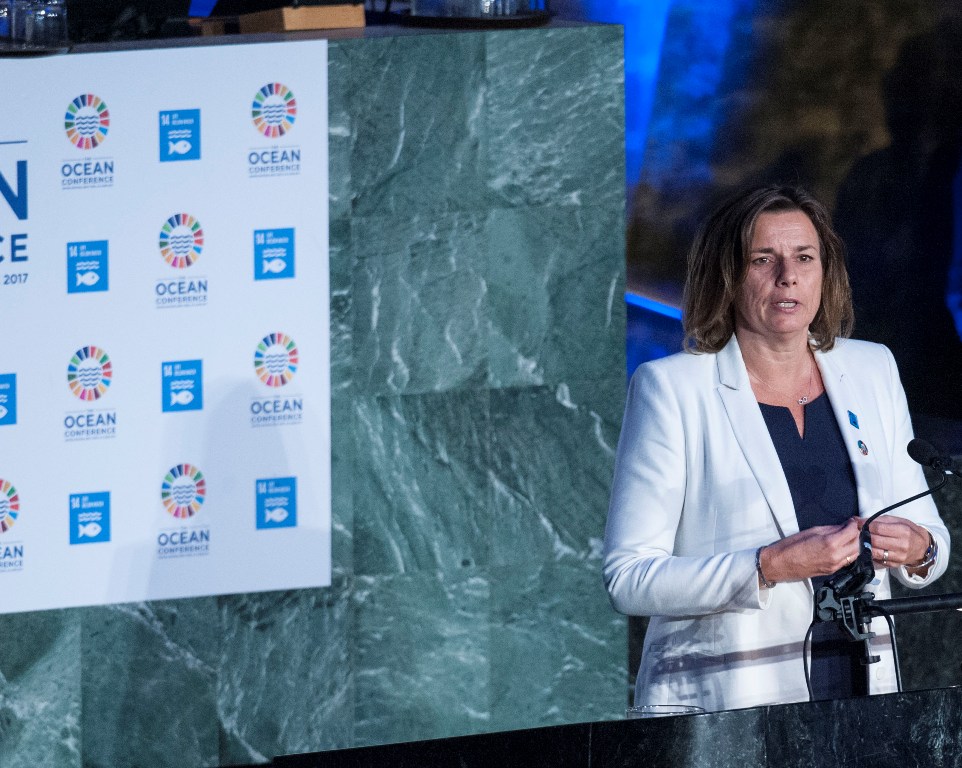
Isabella Lövin, Minister for International Development Cooperation and Climate, and Deputy Prime Minister of Sweden, Co-President of the UN Ocean Conference, speaking at the event. 08 June 2017 United Nations, New York - UN Photo/Kim Haughton
Fiji Prime Minister Frank Bainimarama, and the incoming president of the next Climate Conference, said: “Climate change poses the biggest threat the world has ever known. And the quality of our oceans and seas is also deteriorating at an alarming rate. They are interlinked, because rising sea levels, as well as ocean acidity and warmer waters have a direct effect on our reefs and fish stocks and the prosperity of our coastal communities.”
Ocean Conference Secretary-General Wu Hongbo also noted that the Call for Action that will be adopted at the end of the Conference contained 22 “specific actions promises to galvanize global commitments and partnerships for our Ocean.”
The number of voluntary commitments continue to grow. Importantly, these commitments cover all targets of SDG14 and its linkages with other SDGs.
“I am confident that with the broad support and enthusiasm from Member States and all other stakeholders, with commitment from all of you, the Ocean Conference will bring about solutions and concrete actions in saving our Ocean, and in advancing the implementation of SDG 14.”
About the Call for Action
The Conference will result in a Call for Action that has just been agreed to by countries, http://bit.ly/2rzRT2q, and was formally adopted at the conclusion of the Conference on Friday. Additional outcomes include the results of seven partnership dialogues that will focus on solutions, and the voluntary commitments to action.
The Call for Action stresses the need to implement Sustainable Development Goal 14 and also addresses the interlinkages between this Goal and all other SDGs. In the Call for Action, countries agree to implement long-term and robust strategies to reduce the use of plastics and microplastics, such as plastic bags and single use plastics.
Countries also agreed to develop and implement effective adaptation and mitigation measures that contribute to ocean and coastal acidification, sea-level rise, and increase in ocean temperatures, and to addressing the other harmful impacts of climate change on the ocean.
The Call takes note of the Paris Agreement on climate change.
It also includes measures to protect coastal and blue carbon ecosystems such as mangroves, tidal marshes, seagrass, and coral reefs, and wider interconnected ecosystems, as well as enhancing sustainable fisheries management, including to restore fish stocks in the shortest time feasible at least to levels that can produce maximum sustainable yield. Countries are called upon to decisively prohibit certain forms of fisheries subsidies which contribute to overcapacity and overfishing, and eliminate subsidies that contribute to illegal, unreported and unregulated
fishing.
Please visit the following websites for information on the respective events:
The Ocean Conference: https://oceanconference.un.org/
World Environment Day: http://worldenvironmentday.global/
World Oceans Day: http://www.un.org/en/events/oceansday/
SDG Media Zone: http://sdgmediazone.org/oceansconference/
Day by Day overviews of The UN Ocean Conference
By SDG Media
June 8, 2017
On Thursday morning, plenary celebrated the World Oceans Day. Noting that the ocean makes Earth unique in the solar system, Co-President Isabelle Lövin said World Oceans Day celebrates our dream of a healthy and productive ocean. UN General Assembly President Peter Thomson said World Oceans Day also celebrates our awareness of the need to “right the wrongs” we have done to the ocean. Noting more than 1,000 voluntary commitments submitted, he said the conference is a turning point towards protecting the ocean for posterity. Plenary heard from scientists, ocean researchers, filmmakers, activists, conservationists, private entrepreneurs and community and youth representatives on initiatives to reverse ocean degradation.
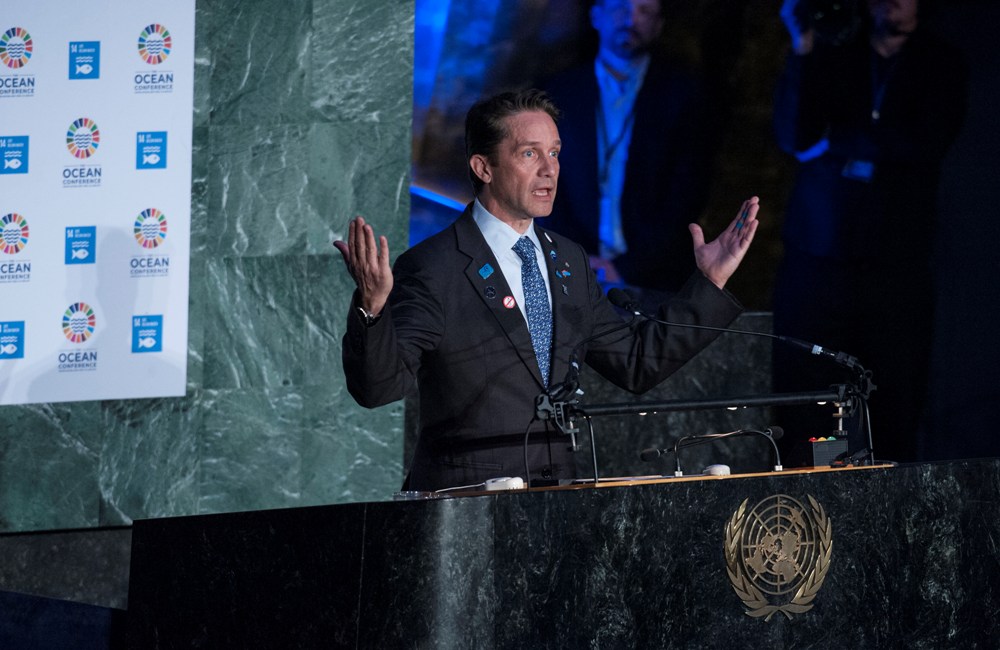
Ocean conservationist Fabien Cousteau speaking at the event. 08 June 2017 United Nations, New York - UN Photo/Kim Haughton
Special Event Commemorating World Oceans Day 2017: A special event was held in the General Assembly Hall to mark World Oceans Day (8 June). The event included statements from world-renowned ocean experts and explorers, representatives from coastal communities, and voices from current and future generations, as well as a performance by Fijian dancers.
In the afternoon, plenary continued the general debate. Member States showcased efforts to expand coverage of marine protected areas (MPAs) and reduce or ban single-use plastics, regional initiatives, and innovative financial mechanisms for sustainable ocean management. Many called for timely completion of the negotiations for an international legally binding instrument on marine biodiversity beyond national jurisdiction.
A partnership dialogue was devoted to increasing scientific knowledge, and developing research capacity and transfer of marine technology. Participants addressed, among other issues, the need for: well-funded, independent research, and better use and transfer of existing technologies; science to defend long-term societal interests; understanding marine ecosystems’ and species’ responses to climate change; science-based policy making; and capacity building and technology transfer, according to developing countries’ needs, rather than externally identified priorities.
June 7, 2017
On Wednesday, plenary continued the general debate. Member States drew attention to institutional developments for implementation of the 2030 Agenda for Sustainable Development; highlighted commitments to combat illegal, unreported and unregulated (IUU) fishing and to increase coverage of marine protected areas (MPAs) in their territorial waters; and stressed the importance to fully implement the Addis Ababa Action Agenda on financing for development and proceed with subsidies’ reform.
In the morning, a partnership dialogue addressed making fisheries sustainable. Participants discussed the role of MPAs in sustainable fisheries and criteria for other area-based conservation measures; challenges related to IUU fishing and fisheries subsidies; and cooperation and partnerships to build sustainable fisheries.
In the afternoon, a partnership dialogue focused on increasing economic benefits to Small Island Developing States (SIDS) and Least Developed Countries (LDCs) and providing access for small-scale artisanal fishers to marine resources and markets. Participants addressed the role of small-scale fishing in the economies of SIDS and LDCs and in communities’ livelihoods; prerequisites for improving market access, including in relation to infrastructure development, access to technology and organization through cooperatives; and diversification of local ocean economies beyond fisheries.
June 6, 2017
On Tuesday, plenary continued the general debate. Member States outlined commitments on increasing marine protected area coverage, reducing or banning plastic bags and microplastics, enhancing integrated coastal management, and improving pollution control, among others.
In the morning, a partnership dialogue addressed managing, protecting, conserving and restoring marine and coastal ecosystems. Participants highlighted the important role of marine and coastal ecosystems and marine protected areas in terms of the entire sustainable development agenda, further noting the need for community empowerment, stakeholder involvement, science-based and coherent policies, and partnerships.
In the afternoon, a partnership dialogue addressed minimizing and addressing ocean acidification, stressing the importance of the Paris Agreement on climate change to mitigate ocean acidification, sharing local adaptation strategies, and underscoring the role of marine protected areas for ecosystem restoration and resilience.
June 5, 2017
The Ocean Conference opened on Monday, 5 June 2017. Plenary addressed organisational matters and heard statements from high-level Member State representatives and UN officials. In the afternoon, a partnership dialogue focused on addressing marine pollution.
Plenary elected Josaia Voreqe (Frank) Bainimarama, Prime Minister of Fiji, and Isabella Lövin, Minister for International Development Cooperation and Climate and Deputy Prime Minister of Sweden, as Conference Co-Presidents.
Recalling the borderless nature of the ocean, Co-President Isabella Lövin expressed hope for the conference to be the “game changer” the ocean needs. Co-President Frank Bainimarama highlighted the threats of climate change and ocean litter, noting that greedy nations and commercial interests threaten livelihoods in small island developing states.
UN Secretary-General António Guterres pointed towards ways SDG 14 (Conserve and sustainably use the oceans, seas and marine resources for sustainable development) serves as a roadmap towards a clean ocean, including: ending the dichotomy between economic activities and ocean health; building strong partnerships and political leadership based on the existing legal framework, such as on MPAs and fisheries management; making new funding commitments; deepening our knowledge base; and sharing best practices. General Assembly President Peter Thomson (Fiji) considered the UN Ocean Conference the “best opportunity we will ever have to reverse the cycle of decline in which human activities have put the ocean.”
In the afternoon, a partnership dialogue on addressing marine pollution shared perspectives on challenges and solutions on marine litter, including addressing land-based pollution and reducing plastics and microplastics production and consumption.
Northern Beaches Film Duo at Oceans Conference
Curl Curl based duo James Sherwood and Danielle Ryan work together as a team producing video and documentary work, primarily specialising in the natural world. They are currently working on The Map to Paradise, which Pittwater Online News ran something about in 2016, and also promoted the fundraising Mother Ocean Exhibition held at Warringah Creative Space, North Curl Curl in February 2016 to see this new project advance.
Of The Map to Paradise project Danielle says, 'Over the last few years, we've travelled around Australia making five short films on marine protected areas, and so creating a feature documentary which looks at the global picture is naturally the next step for us.'
This week these local documentary makers attended the UN Ocean Conference,(see report this Issue) Danielle writing a blogpost for Nature for All, 'SUITS, TIES & A CELEBRITY GOODWILL AMBASSADOR - The Ocean Conference, 2017' about the experience of being present for Celebrity TV star and environmental activist, Adrian Grenier’s inaugural speech.
“Whatever debates or disputes we have, there are some things that are undeniable. No dad wants to teach his daughter to swim at a beach that is filled with plastic and cigarette buts. No mum wants to see her son gasp for air while they kick around a ball at a park - that we can all agree on. Together, we can do something about it,” - Entourage Hollywood Celebrity Adrian Grenier, making his first address at the United Nations for the Oceans Conference as the newly appointed UN Environment Goodwill Ambassador. - Post from The Map to Paradise Facebook page, June 7, 2017.
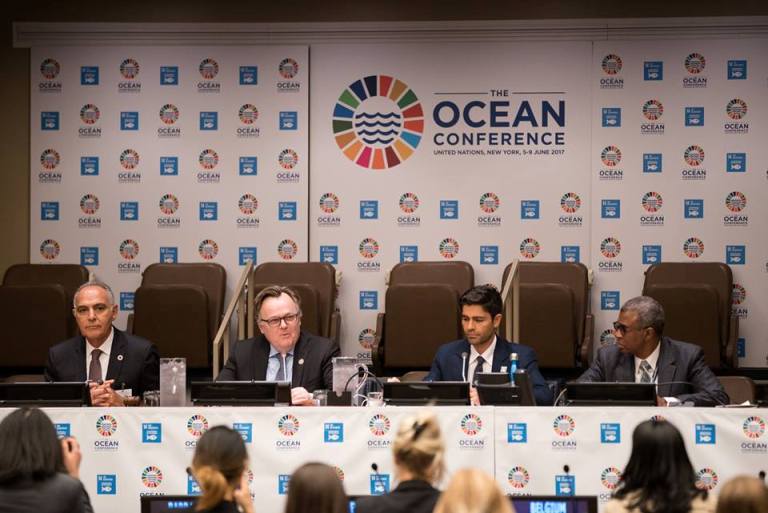
Adrian Grenier - Founder of the Lonely Whale Foundation at UN Oceans Conference 2017
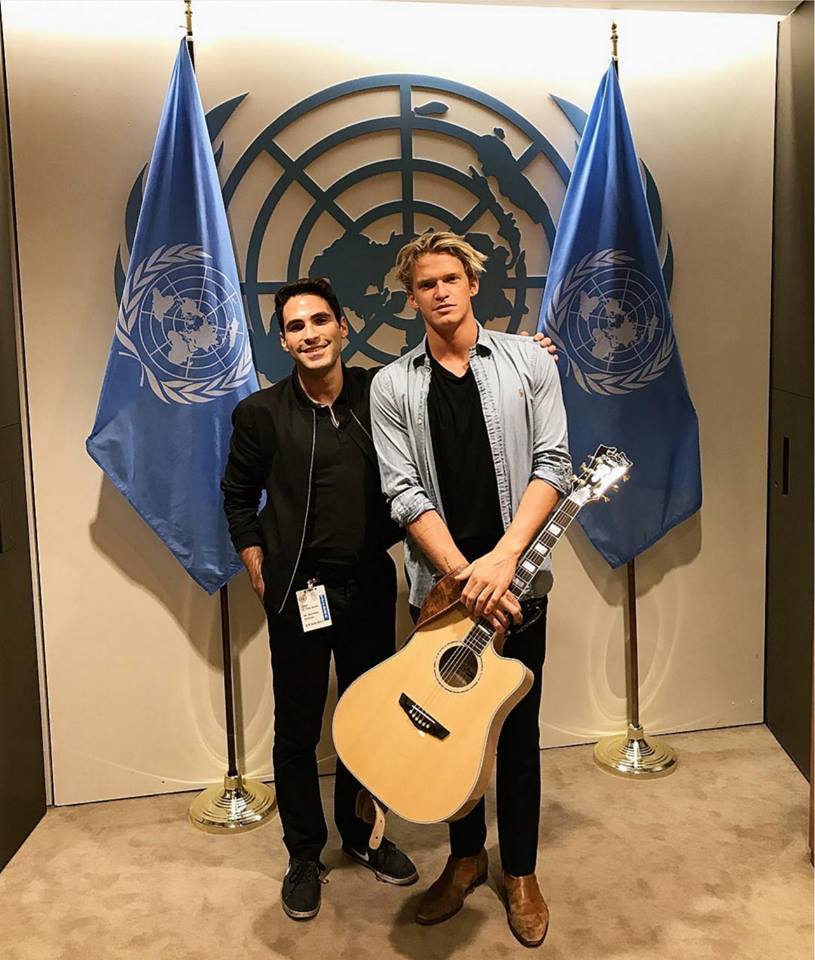
Australian musician Cody Simpson, also attended and discussed his connection to the sea and the importance of playing an active role in saving the oceans and protecting our future. From Cody Simpson Facebook page
Countries agree on decisive and urgent actions to restore marine world to health as Ocean Conference concludes: Universal agreement on need for measures to reverse ocean deterioration
New York, 9 June, 2017
The 193 Member States of the United Nations unanimously agreed to a set of measures that will begin the reversal of the decline of the ocean’s health as the five-day Ocean Conference concluded this afternoon. The outcome document, together with more than 1,300 commitments to action, marks a breakthrough in the global approach to the management and conservation of the ocean.
The Ocean Conference, the first UN conference of its kind on the issue has raised global consciousness of ocean problems ranging from marine pollution to illegal and over fishing, from ocean acidification to lack of high seas governance. By including all stakeholders in the discussions, the Conference produced a comprehensive and actionable range of solutions.
“The Ocean Conference has changed our relationship with the ocean,” said the President of the UN General Assembly Peter Thomson. “Henceforth none can say they were not aware of the harm humanity has done to the ocean’s health. We are now working around the world to restore a relationship of balance and respect towards the ocean.”
Wu Hongbo, Under-Secretary-General for Economic and Social Affairs and Secretary-General of the Ocean Conference, said the Conference marked a major step forward for the implementation of the Sustainable Development Goals. “Participants from member States, NGOs, civil society, the private sector, the scientific community and academia engaged in wide-ranging discussion and shared state-of-the-art knowledge and latest information on marine science and challenges,” he said.
“They showcased and put forward many innovative solutions, which can help us achieve Sustainable Development Goal 14, and through its interlinkages the other SDGs and targets.”
Conference Outcomes
Recognizing that the wellbeing of present and future generations is inextricably linked to the health and productivity of the ocean, countries collectively agreed in the Call to Action “to act decisively and urgently, convinced that our collective action will make a meaningful difference to our people, to our planet and to our prosperity.”
While the ocean partnership dialogues focused on the multiple problems and challenges the ocean is facing, all participants offered solutions and commitments to reverse these challenges.
The Call for Action was formally adopted at the conclusion of the Conference today, as well as the reports from the seven partnership dialogues that have focused on scaling up solutions, and the voluntary commitments to action.
In the Call for Action, countries agree to implement long-term and robust strategies to reduce the use of plastics and microplastics, such as plastic bags and single use plastics. Countries also agreed to develop and implement effective adaptation and mitigation measures that address ocean and coastal acidification, sea-level rise and increase in ocean temperatures, and to target to the other harmful impacts of climate change on the ocean. The Call recognizes the importance of the Paris Agreement on climate change.
The Call for Action also includes measures to protect coastal and blue carbon ecosystems, such as mangroves, tidal marshes, seagrass and coral reefs, and wider interconnected ecosystems, as well as enhancing sustainable fisheries management, including to restore fish stocks in the shortest time feasible at least to levels that can produce maximum sustainable yield. Countries are called upon to decisively prohibit certain forms of fisheries subsidies which contribute to overcapacity and overfishing, and eliminate subsidies that contribute to illegal, unreported and unregulated fishing.
The commitments, in turn, address all the issues needed to achieve Sustainable Development Goal 14—Conserve and sustainably use the oceans, seas and marine resources—and produced significant results:
- Commitments made at the Conference indicate that the world is well on track to protect over 10 per cent of the globe’s marine areas by 2020. The commitments made during the conference add 4.4 per cent of marine areas to the existing number.
- Many countries announced steps to reduce or eliminate various single use plastics, such as plastic shopping bags, which ultimately find their way to the ocean.
- Numerous countries announced that they were stepping up their efforts to reduce the amount of sewage and pollution entering the ocean from land-based activities.
- Many commitments focused on expanding scientific knowledge about the ocean and developing and sharing innovative technologies to address ocean challenges.
- There were new commitments to protect and manage fisheries. Some countries announced “no-take zones” for certain fishing.
- Commitments were made to establish systems that allow consumers to source sustainable fish.
New commitments were also made to combat illegal, unreported and unregulated fishing, and to curtail fishing subsidies that are working to deplete fish stocks.
The Ocean Conference 5-9 June 2017 UNHQ
Our oceans, our future: partnering for the implementation of Sustainable Development Goal 14The high-level United Nations Conference to Support the Implementation of Sustainable Development Goal 14: Conserve and sustainably use the oceans, seas and marine resources for sustainable development was convened at United Nations Headquarters in New York from 5 to 9 June 2017, coinciding with World Oceans Day, to support the implementation of Sustainable Development Goal 14.
The Governments of Fiji and Sweden had the co-hosting responsibilities of the Conference.
The Conference aims to be the game changer that will reverse the decline in the health of our ocean for people, planet and prosperity. It will be solutions-focused with engagement from all.
The Conference shall:
• Identify ways and means to support the implementation of Sustainable Development Goal 14;
• Build on existing successful partnerships and stimulate innovative and concrete new partnerships to advance the implementation of Goal 14;
• Involve all relevant stakeholders, bringing together Governments, the United Nations system, other intergovernmental organizations, international financial institutions, non-governmental organizations, civil society organizations, academic institutions the scientific community, the private sector, philanthropic organizations and other actors to assess challenges and opportunities relating to, as well as actions taken towards, the implementation of Goal 14;
• Share the experiences gained at the national, regional and international levels in the implementation of Goal 14;
• Contribute to the follow-up and review process of the 2030 Agenda for Sustainable Development by providing an input to the high-level political forum on sustainable development, in accordance with resolutions 67/290 of 9 July 2013, 70/1 of 25 September 2015 and 70/299 of 29 July 2016, on the implementation of Goal 14, including opportunities to strengthen progress in the future.
The Conference comprised plenary meetings, partnership dialogues and a special event commemorating World Oceans Day.
The Conference shall adopt by consensus a concise, focused, intergovernmentally agreed declaration in the form of a "Call for Action" to support the implementation of Goal 14 and a report containing the co-chairs' summaries of the partnership dialogues, as well as a list of voluntary commitments for the implementation of Goal 14, to be announced at the Conference.
The President of the General Assembly convened a two-day preparatory meeting, on 15-16 February 2017, at United Nations Headquarters in New York, chaired by H.E. Mr. Alvaro Mendonya Moura, Permanent Representative of Portugal to the UN, and H.E. Mr. Burhan Gafoor, Permanent Representative of Singapore to the UN, the two co-facilitators, with a view to considering the themes for the partnership dialogues and elements for a "Call for Action".
Mr. Wu Hongbo, Under-Secretary-General for Economic and Social Affairs of the United Nations is the Secretary-General of the Conference. Mr. Miguel de Serpa Soares, Under-Secretary-General for Legal Affairs and United Nations Legal Counsel is the special advisor to the Presidents of the Conference on oceans and legal matters.

The Ocean Conference opens with a Fijian traditional welcome ceremony. United Nations, New York - UN Photo/Mark Garten
Opening Ceremony of UN Ocean Conference
The UN Ocean Conference took place at UN headquarters in New York from 5 to 9 June 2017, coinciding with World Oceans Day (8 June). Co-chaired by Fiji and Sweden, the Conference aims to support the implementation of Sustainable Development Goal 14: Conserve and sustainably use the oceans, seas and marine resources for sustainable development.
Australian Indigenous art at the United Nations on World Oceans Day
8 June 2017
Joint Media Release:
Senator the Hon Mitch Fifield, Minister for the Arts
Senator the Hon Concetta Fierravanti–Wells, Minister for International Development and the Pacific
The Hon Warren Entsch MP, Federal Member for Leichhardt
The Australian Government is proud to support a major exhibition of Indigenous art from Cape York and the Torres Strait opening today at the United Nations headquarters in New York to mark World Oceans Day.
Australia’s Aboriginal and Torres Strait Islander arts have a powerful and distinctive presence, which lie at the heart of Australia’s diverse contemporary culture and national identity.
Twenty-eight new ghost-net sculptural works by artists from the Pormpuraaw Art and Culture Centre on the west coast of Cape York will feature in the exhibition, Australia: Defending the Oceans.
Brian Robinson will exhibit his sculpture Stingray: Ocean Guardian, which relays the creation story of the Great Barrier Reef and acknowledges his heritage and the stingray as one of his family’s totems.
This ambitious exhibition celebrates the creativity and dynamism of contemporary Indigenous cultures and highlights the important role that Indigenous artists and communities play in protecting coastal environments.
The exhibition reflects the environmental message of World Oceans Day to encourage solutions to plastic pollution and prevent marine litter for a healthier ocean and a better future.
Turning the tide on marine pollution
8 June 2017: AFMA
As a country surrounded by water, it is no surprise that Australians have a close relationship with the ocean, and there has never been a better time to celebrate all that oceans bring to the Australian way of life, including great tasting Australian seafood, than today, World Oceans Day.
The theme this year, Our Oceans, Our Future, strongly aligns with the Australian Fisheries Management Authority’s (AFMA) approach to fisheries management, whereby science based decisions implemented through strict decision making, aim to ensure a healthy supply of Australian seafood for current and future generations to enjoy.
Moreover, AFMA also works with industry, scientists, the environmental sector and other government agencies to help ensure healthier oceans. This work includes educating about the harmful impacts of abandoned fishing gear, and its retrieval.
“To help highlight the seriousness that marine debris has on the environment, AFMA recently commissioned four Indigenous artists to turn retrieved ghost nets (abandoned fishing nets) into works of art,” AFMA’s CEO Dr James Findlay said.
“Unfortunately, ghost nets often drift into Australia’s northern waters from foreign fishing operations further north.
“Through this work, AFMA is hoping to raise awareness about this serious issue and more broadly, the harmful impacts of marine pollution on our oceans.
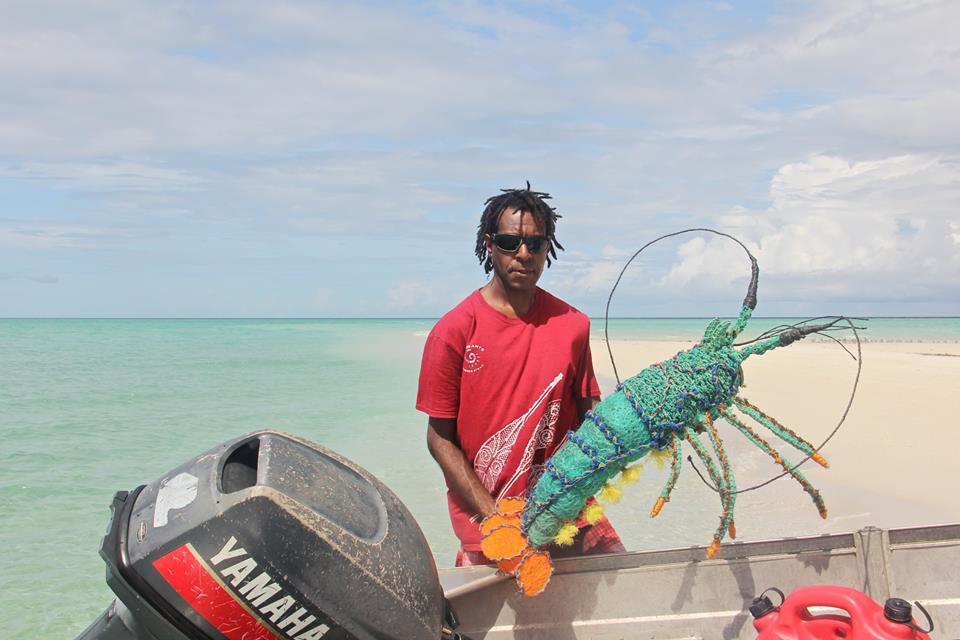
Erub Arts - Darnley Island artist Solomon Charlie with his Crayfish ghost net artwork commissioned by AFMA
“AFMA works tirelessly to help ensure that the shared resource that is the ocean, can continue to be enjoyed by all.
“I encourage all Australians, on today, World Oceans Day, to celebrate this wonderful resource, and everything it offers, including delicious tasting, sustainably managed seafood.”
More information on Commonwealth fisheries management can be found at afma.gov.au, or check out our Facebook page to see photos of the ghost net artwork.